In the spirit of spreading breast cancer awareness, this concise MedDigest article is an essential guide on breast cancer screening that will equip you with the necessary information to make informed decisions and prioritize your well-being.
What is Breast Cancer?
📌Breast cancer is a disease in which malignant (cancer) cells form in the tissues of the breast.
📌Breast cancer is the second leading cause of death from cancer in American women.
📌Black women die from breast cancer at a higher rate than White women according to the Centers for Disease Control and Prevention (CDC).
Risk Factors of Breast Cancer
- Getting Older. The risk of breast cancer increases with age. Most are diagnosed after age 50.
- Genetic Mutations. Women who have inherited changes to certain genes (BRCA1 and BRCA2) are at higher risk of breast and ovarian cancer.
- Reproductive History. Starting menstrual periods before age 12 and starting menopause after age 55 expose women to hormones longer, raising their risk of getting breast cancer.
- Having Dense Breasts. Women with dense breasts are more likely to get breast cancer.
- Previous Treatment Using Radiation Therapy. Women who had radiation therapy to the chest or breasts have a higher risk of getting breast cancer.
Understanding Breast Cancer Screening
Breast cancer screening means checking the breasts for cancer before there are signs or symptoms of the disease.
Because Breast cancer affects millions of individuals worldwide, early detection is a critical factor in successful treatment.
Routine screening is the cornerstone of early identification, and knowledge is your greatest ally. Let’s delve into the essentials:
🩹Mammograms: Your First Line of Defense
Mammograms are X-ray images of the breast that can identify tumors too small to feel. Here’s what you need to know:
- When to Start: Generally, women aged 40 and older should have annual mammograms, but individual recommendations may vary based on risk factors.
The United States Preventive Services Task Force (USPSTF) states in its latest updated recommendation that Women who are at average risk for breast cancer should start mammogram screening at age 40 and get one every two years until age 74.
Note however, women who are considered high risk, such as those who have had breast cancer, carry genetic mutation, or have experienced high-dose chest radiation before age 30, should continue to follow their doctor’s advice on screening age and frequency.
🩹Clinical Breast Exams: Professional Insight
Clinical breast exams, conducted by healthcare providers, typically a doctor or a nurse, can help detect abnormalities. The healthcare provider uses his or her hands to feel for lumps or other changes in the breast.
🩹Breast Self-Exams: Knowing Your Body
While not a substitute for clinical exams or mammograms, self-exams are valuable in becoming familiar with your body and recognizing changes in your breasts. You should report any changes that you notice in your breasts to your doctor or health care provider.
Risk Assessment: Understanding Your Vulnerability
I already mentioned factors that may increase your risk of breast cancer, such as older age, family history, and genetics earlier in this thread. If any of the risk factors are positive for you, talk to your doctor about it and how to get screened.
Early Detection: A Lifesaver
The statistics are clear: early detection can save lives. And this makes Breast Cancer Screening even more important. With MedDigest, I curate medical knowledge to get you in the know, in a language easy to understand so you can take control of your health. Talk to your doctor or healthcare provider if you notice anything concerning about your breasts.
Where Can I Go to Get Screened?
You can get screened for breast cancer at a clinic, hospital, or doctor’s office. If you want to be screened for breast cancer, call your doctor’s office. They can help you schedule an appointment.
Questions about Insurance
Most health insurance plans are required to cover screening mammograms every one to two years for women beginning at age 40 with no out-of-pocket cost (like a co-pay, deductible, or co-insurance). Check with your insurance provider to be sure.
What’s New On Breast Cancer Screening
- October of every year – last month was it for 2023 – is designated as the Breast Cancer Awareness Month. With the launch of MedDigest today, this topic could not have been more pertinent and timelier.
- Ontario is lowering the eligibility age for routine breast cancer screening. In a news release on Monday, the province said the minimum age for self-referral for publicly funded mammograms through the Ontario Breast Screening Program will be reduced from 50 to 40, beginning in fall of 2024, per Ontario Ministry of Health.
Breast Cancer Screening and AI Technology
The advent of Artificial Intelligence (AI) has had both immediate and foreseeable impact on almost every industry, at the center of which is healthcare. And as far as Breast Cancer Screening, we are learning that AI could have the capability to pinpoint cancer diagnoses a lot sooner.
A new study published in the journal Radiology last week noted that AI helped predict one-third of breast cancer cases up to two years prior to diagnosis.
The research surveyed imaging data and screening information from Breast Screen Norway exams performed from January 2004 to December 2019.
Take Action for Your Health
Your health is precious, and knowledge is your strongest weapon in the fight against breast cancer. As I advocate for Breast Cancer Screening awareness, I also encourage you to:
- Schedule a discussion with your healthcare provider about your screening plan.
- Share this guide with your loved ones to raise awareness and promote the importance of regular screenings.
- Stay vigilant and always prioritize your well-being at all times.
I hope this guide empowers you to take proactive steps toward a healthier, happier life. Remember, early detection can save lives, and it all begins with you.

